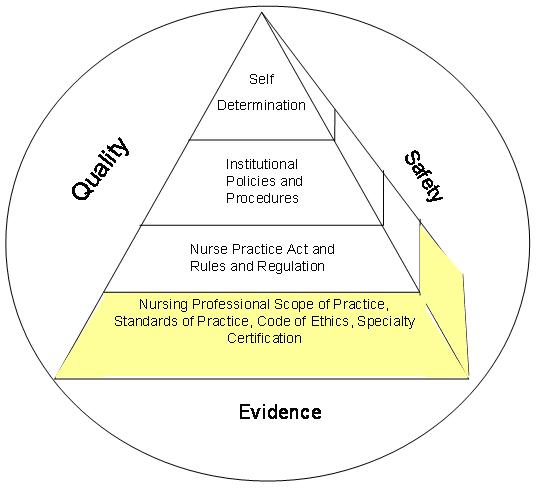Evidence-Based Knowledge is Power
Spring 2014
Implementation of evidenced-based practice is essential to improve the quality of healthcare, as well as to further the nursing profession. A major constituent to achieving both of these goals is to educate and empower nurses so that they will understand “how the strength and relevance of available evidence influences the choice of interventions in provision of patient centered care”(QSEN, 2014). Throughout nursing school students learn that evidenced-based practice is what the nursing profession is grounded upon. Every one of our textbooks is a compilation of clinical evidence that has been gathered throughout the years. As future nurses, we need to realize that evidence collection does not stop when we graduate, yet it is an ongoing process that we must dedicate ourselves to in order to better our profession and our patient’s health outcomes.
One of the reasons that I feel it is so important for nurses to embrace research and evidenced-based practice is because I feel that now is the time for nurses to break free from being considered individuals that merely assist the physician, and prove that there is a separate space in health care that is designated to only our profession. We are the individuals that spend the most one-on-one time with the patients, so we do have a unique perspective of what constitutes quality care and positive patient outcomes. Nurses make up the highest percent of health care professionals throughout the hospital, and furthermore the entire healthcare community. I believe if we could use our strength in numbers to put forth more nursing research, we could create a broader base of clinical evidence, which would assist other professionals in realizing how important the science, and art of nursing really is. Understand that I am in no way suggesting that the nursing profession must breakaway from the interdisciplinary team, but I am merely suggesting we need to secure our position at the table.
The Institute of Medicine defines quality health care as the “degree to which health services for individuals and populations increase the likelihood of desired health outcomes and are consistent with current professional knowledge” (Stevens, 2013). The cornerstone of proper utilization of clinical evidence relating to quality care is for nurses to first understand why these practices are useful. Nurses must comprehend that it is our duty to stay up-to-date with the most current best practices, so that we may provide our patients with health care options that will ultimately suit there unique needs.
References
Pre-Licensure KSAs (2014). Quality and Safety Education for Nurses.
Retrieved from http:// http://qsen.org/competencies/pre-licensure-ksas/
Stevens, K. R., (2013). The Impact of Evidence-Based Practice in Nursing and
The Next Big Ideas.” OJIN: The Online Journal of Issues in Nursing. Vol. 18,
No.2, Manuscript 4.
RESEARCH SUMMARY — FALL 2012
The research methods course has broadened my scope of practice. I feel this course may be one of the most beneficial courses I will take throughout my nursing career. Throughout this course, it was nice to have fellow students to relate to, and even bounce ideas off of. After graduation a few of us may stay in touch, but for the most part we will all be off in different directions sharpening our own individual nursing skills. While practicing the art of nursing, there will be times when we will feel alone. There will be moments when we have to make a critical decision and there will be no one to bounce ideas off of. In these very moments we will find strength in the knowledge gained in the Research Methods course. We will know where to search for the most relevant information, and we will know how to analyze the data and evaluate references. The Research course has taught me that I need to stay current with the modern nursing trends and dedicate my nursing style to following best practices.
The most important aspect of nursing research I have learned is how to analyze data and critically appraise research studies. I want to be a nurse that makes a positive change for my patients, and the only way to do this is to educate myself. This class has given me the tools I will need to do this.
————————————————————————————————————————————————————-
Lavinia Lloyd Dock embodied experience as an action-oriented inquiry. She believed experience, examination of experience, and reflection of experience were continuous and inseparable. One might say, Dock was one of the first nurses to use evidenced-based practice, but instead of reading a book of what the best practices were, she experienced the best practices (of her era) first hand. Her actions were her evidence.
Of course, Dock used evidence-based practices pertaining to cleanliness and nutrition, but the idea of healing patients holistically was an idea of originality. She was a pioneer in nursing education, a powerful social activist, and a role model for nurses everywhere.




Leave a comment